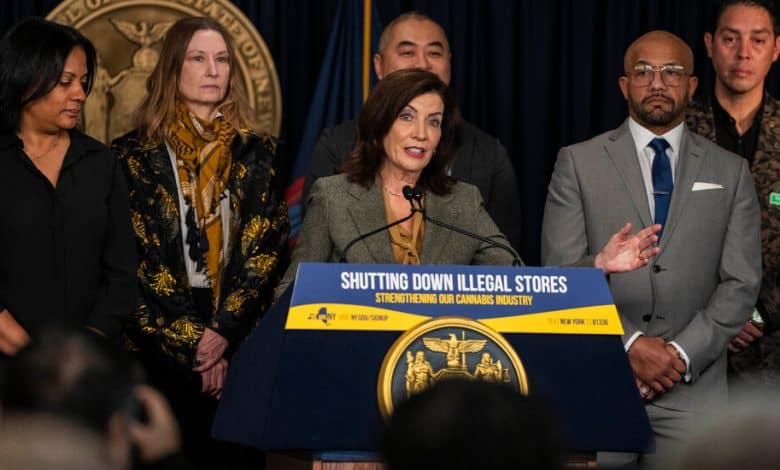Hochul Pushes for Cannabis Crackdown to Get ‘Some Teeth’

Gov. Kathy Hochul visited New York City on Wednesday to drum up support for her latest proposals for shutting down the unlicensed marijuana shops that have exploded in number in the wake of the legalization of recreational cannabis.
There are more than 400 illicit weed shops in Manhattan alone — outnumbering Starbucks stores in the borough and far surpassing the few dozen licensed cannabis retailers in the entire state.
At a news conference at the governor’s office in Midtown Manhattan attended by several owners of licensed dispensaries, Ms. Hochul sought to allay concerns about a return to the heavy-handed enforcement tactics of the war on drugs while pushing for measures that she said would give “some teeth” to the so far ineffective efforts to wipe out the unlicensed shops.
Her appearance came as state lawmakers were considering her proposal to strengthen the hand of local agencies by giving them the power to padlock stores. She was joined by licensed dispensary owners who said that the legal market could not compete with the cut-rate prices in illicit shops. The governor and business owners also called on search engines and social media companies like Google and Yelp to remove content about unlicensed shops, which they said added to the confusion among consumers about what weed shops were licensed and which were not.
The governor said that the illicit shops posed a public health hazard and undermined the state’s effort to build a cannabis industry that could provide opportunities for people harmed by the war on drugs. She said that efforts to deter the stores with raids and fines over the last year had been concentrated in the hands of too few agencies and had not been effective. Her proposal would make it easier for the state’s Office of Cannabis Management to obtain court orders to padlock stores and would allow for the orders to be executed by local agencies that had more personnel.
“More and more cash keeps going in their doors and not the doors of our legitimate operators — and that’s what needs to change,” she said.
